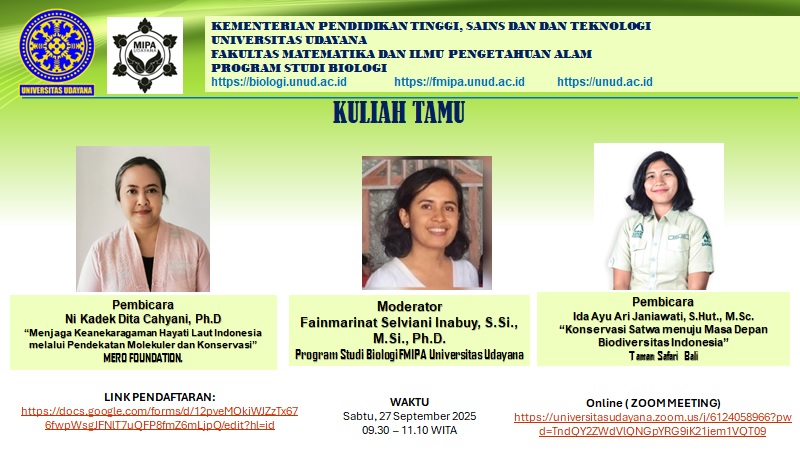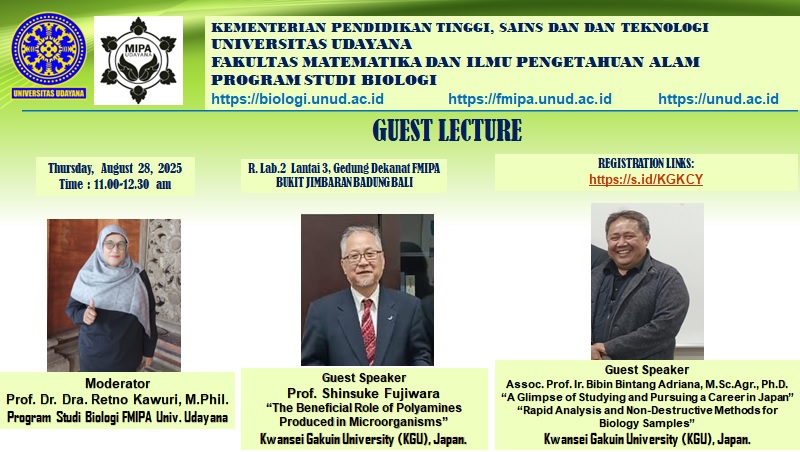Strengthening Curriculum Based on Biological Conservation Practices in Mount Batur and its surroundings
The Biology Study Program,
Faculty of Mathematics and Natural Sciences, Udayana University, is committed
to providing quality education to students. One of the efforts is to strengthen
the curriculum with stakeholders regularly. On October 21-22, 2023, the Biology
Study Program strengthened the curriculum with three partners who have major
contributions to conservation practices on Mount Batur and its surroundings,
namely the Natural Resources Conservation Center (BKSDA) Bali, Unesco Batur
Global Geopark, and Kelompok Tani Hutan (KTH) Bukit Pule Gunung Batur-Bukit
Payang.
The activity took place in three sub-activities
which were opened with remarks from the Dean of FMIPA Udayana University, Prof.
Dra. Ni Luh Watiniasih, M.Sc., P.D. The first session in sub-activity I was a
presentation and discussion on graduate competencies needed in entering the
world of work, especially those related to conservation. The speaker at this
session was Mr. Sulistyo Widodo as Head of Conservation Region II BKSDA Bali
who conveyed about the variety of biodiversity potential and its threats in
Gunung Batur-Bukit Payang Nature Park, as well as the abilities that biology
graduates need to have. After that, continued with a presentation from I Wayan
Gobang Edy Sucipto as Daily Chairman of the Unesco Batur Global Geopark which
discussed the lack of biodiversity data in the geopark area, then the next
session by I Nyoman Arnaya from Kelompok Tani Hutan (KTH) Bukit Pule which
discusses a lot about the technical aspects of malapari management (Pongamia
pinnata) in its area. Planting malapari is one of the efforts to rehabilitate
dry land while producing quality seeds. This activity is also one of the
implementations of collaboration between the Biology Study Program FMIPA with
CIFOR, BRIN, and other institutions.
After the presentation session,
the activity continued with a discussion led by the moderator, Mrs. Fainmarinat
S. Inabuy, Ph.D. The discussion session went very enthusiastically. Various
questions and problems can be discussed conducively, and can be linked to the curriculum.
Without waiting much time, after sub-activity I ended, participants immediately
conducted a curriculum review based on the input that had been obtained in
sub-activity II. One result is the implementation of biodiversity data capture
and processing techniques. In one previous discussion, one of the main concerns was the need for data on
carbon sequestration in trees. This sampling technique can be accommodated in
compulsory courses.
The next day, the activity continued to sub-activity III with an evaluation of the implementation of learning followed by the revision of RPS, the preparation of module handbooks, and the preparation of staff handbooks. Each session in this sub-activity is handled by TPPM-PS, so that it can be integrated with applicable educational standards. With the end of this activity, it is hoped that the Biology Study Program of FMIPA Udayana University will be able to provide more quality education.


.jpg)
FACULTY OF MATHEMATIC AND NATURAL SCIENCES